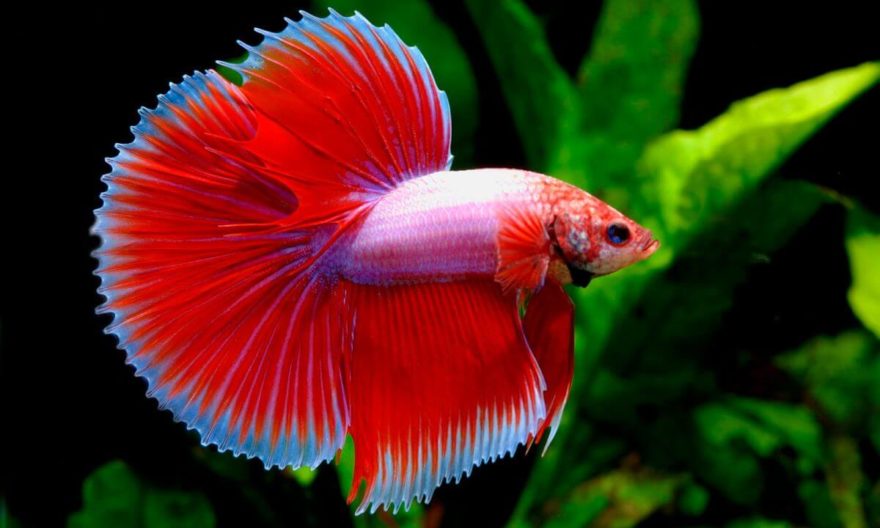
Every betta fish keeper dreams of having a striking colorful fighting fish, dancing around their decorative tank full of health and vitality.
My aim with this article is help you get started with your hobby of keeping Siamese Fighting Fish, by discussing some of the basics of betta care.
There is no reason why betta care shouldn’t be simple and successful for you. All it requires is an understanding of these exotic colorful fish and their requirements.
Once you get going and you are ready to learn more about raising and possibly breeding bettas, then I suggest that you consider investing in one of the books listed at the end of this article. They are all written by experienced betta fish keepers and are jammed packed with easy to read quality information to ensure success with your hobby. I say ‘investing’, as that is how I see it. The invaluable information you gain from these experts will save you disappointments, time and expense.
Betta Health
More often than not sickness in
betta fish can be attributed to their water. Many betta keepers are often
baffled as to why their pet becomes sick when they are doing all the right
betta care requirements and their betta’s tank appears clear, clean and
healthy.
The problems with their sick fish will stem from a lack of understanding of
fish tank water parameters, such as: the Nitrogen Cycle,
ammonia/nitrite/nitrate toxicity, pH, temperature and detritus.
Signs of a Healthy Betta
- Intense coloration
- Swimming actively and without difficulty
- Flaring
- Constructing a bubble nest
- Eating well
- Swims to glass at feeding times
- Full finnage
- Good body shape (no bloating, bumps or missing scales)
- Clean smooth gills
- Clear and dark eyes
Signs of a Sick Betta
- Dull, splotchy or gray color
- Sluggishness
- Loss of appetite, uninterested in food
- Unconcerned with surroundings
- Clamped finnage, shredded, torn or missing fins
- Bloated, weight loss, bumps, open wounds, red streaks, missing scales
- Swollen or red gills
- Cloudy, sunken or protruding eyes
- Fungal growths on skin appearing as a grey fuz or white spots
Feeding
I find feeding time to be very enjoyable because I get to interact with my fish. Healthy bettas will always surface when you come near their tank, anticipating food.
Feeding Bettas is not as easy as you
may think, as it takes a little skill and knowledge.
A betta’s natural diet of live insects and insect larvae have a high moisture
content of about 95% or higher. So it is important that your bettas are
fed fish food with a high moisture content. Too much dry food or dry
fozen live foods, which can swell up when put with water, cause blockages and
add pressure to betta fish swim bladders.
Betta fighting fish are unique and using products and food formulated especially for them is a good way to ensure that they are getting the conditions and nutrients they need to stay healthy and active.
It is important for quality betta
care, to provide a well balanced variety of foods rather than fish food you buy
off the shelf at supermarkets. Look for an especially formulated betta food and
supplement this with live foods such as blood worms every other day.
Feed your betta two to three times a day. Don’t overfeed, as the uneaten food
will pollute their water. My suggestion is to feed them two to three bits of
food or what they can eat in a minute each time you feed them.
When conditioning bettas to breed, it is essential that they are provided with the necessary nutrients in order for them to manage the quite strenuous process of breeding. The delicate betta fry requires the right food and size of food to survive and grow.
Betta Aquarium and Tanks
Having the right equipment is paramount to easy betta care. First on your list will be your betta tank or bowl. Rather than discuss requirements for your betta fish tank within this article.
Acclimation
Introducing a betta fish to new water can be very stressful for any fish, especially if there are differences in pH and temperature. Betta care during this time is key to the survival of your fish. Take the time to float your fish in his cup inside his new tank. Add a little tank water to the cup every 5 minutes. Continue this for at least 30 minutes before releasing him into his new home.
Water testing
The necessity to water test must not
be underestimated. Bettas, are very sensitive to water quality and any changes
in water parameters. It’s a fundamental part of keeping fish healthy.
The very essentials you should test for regularly are ammonia, nitrite,
nitrate, and pH. Ensure you do a daily check of your tank’s water temperature
too and keep in mind that toxins like ammonia, nitrite, and nitrate are
odorless and colorless and will cause damage long before you see any signs of
polluted water. Just about all betta sicknesses are a result of being exposed
to these toxins.
You get what you pay for when it comes to water testing products. Cheaper test
strips will guide you, but lack accuracy. It is better to buy the bottled
solutions used for testing as they will give an accurate reading.
Water changes
There are many variances (pH,
volume, fish metabolism, food fed, temperature, beneficial bacteria, etc) that
affect water quality. The general rule is that the smaller your tank the more
often you need to change the water.
Using a test water kit will let you know how often you need to clean your tank.
Once per week is generally a minimum for betta care; however, a daily partial
change may also be necessary for smaller bowls.
Larger tanks with a filter containing beneficial bacteria may only need 20%
water changes once a week, or even once every other week.
Temperature
Bettas are a tropical fish native to
the rice paddies in tropical Asia. They, therefore, require a temperature of
between 78 to 80 degrees Fahrenheit. Not many homes are kept at this
temperature and a tank without a heater will cause your beta to succumb to
stresses from living in water that is too cool, resulting in ill health.
What is even more important than maintaining a warm temperature is keeping
their temperature constant. Night and day temperatures can vary greatly and can
put tremendous pressure on your fish’s immune system.
Products
Betta care products include betta
water conditioners and clarifiers, betta medications and betta vitamins. Betta
care isn’t hassle free, and specific care must be taken to help keep your
swimming friend healthy and happy.
Well, there you have it! Some of the very basics of betta care which hopefully
will help you get going with your pet fish. Unfortunately, many of these basic
betta care requirements are overlooked by new fish keepers leading to sick fish
and disappointment.
If you are serious about betta care, or if you are interested in breeding your
Siamese Fighting Fish, then it would be well worth your while investing in
guidance from experienced betta fish keepers and breeders. From my experience,
pet store owners don’t give the best advice on raising bettas and there are
many second rate books on the topic of betta care out there, many of which only
provide you with the fundamentals. Having the wrong advice, or a lack of
guidance, will result in expense and heartbreak.




